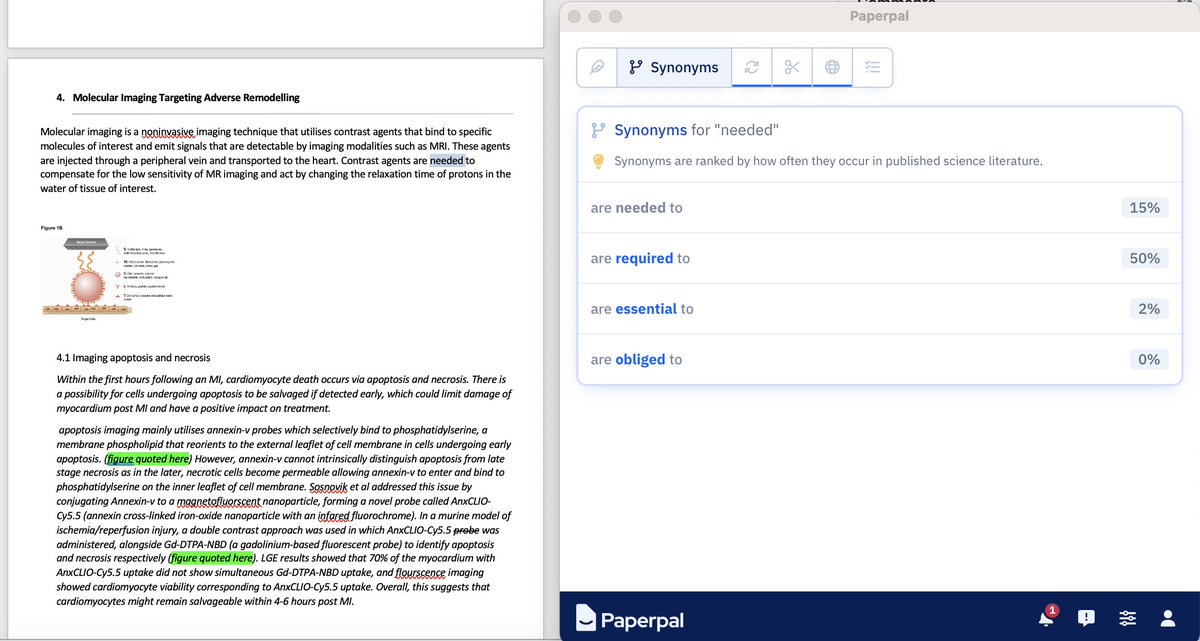Don’t waste time using ChatGPT or QuillBot to write your thesis.
Instead, use Paperpal which is an AI-powered app.
Here’s how I get high-quality academic writing in minutes:
Instead, use Paperpal which is an AI-powered app.
Here’s how I get high-quality academic writing in minutes:
Paperpal can be used (1) on the web or (2) installed as a Word Add-In.
I prefer to use the Word Add-in to edit as I write – this saves hours of time and supports a seamless writing experience.
I prefer to use the Word Add-in to edit as I write – this saves hours of time and supports a seamless writing experience.

Paraphrase Text
Select the text you want to re-write.
The newly written text has the same meaning, numbers and academic tone. Excellent for giving your words an academic boost.
The suggestions will be loaded on the 'Rewrite' tab within seconds.
Select the text you want to re-write.
The newly written text has the same meaning, numbers and academic tone. Excellent for giving your words an academic boost.
The suggestions will be loaded on the 'Rewrite' tab within seconds.
Trim Text
Paperpal’s Trim feature calculates the word count of your selected sentences or paragraph and provides a reduced version of your text, matching the required word count.
Paperpal’s Trim feature calculates the word count of your selected sentences or paragraph and provides a reduced version of your text, matching the required word count.
This tool is great for times when you’re struggling to reduce words without losing the meaning. It can also help reduce repetition and help your work sound more concise.
Language Check
This is a fantastic feature. Paperpal picks up on errors within academic writing and suggests edits as you write.
This includes checking word choice, spelling, punctuation, redundancy and much more.
This is a fantastic feature. Paperpal picks up on errors within academic writing and suggests edits as you write.
This includes checking word choice, spelling, punctuation, redundancy and much more.
Contextual Synonyms
Do you keep repeating the same word? Stuck on finding a better one?
Simply highlight the word and Paperpal will suggest some other academic words related to this one.
In this example, I much prefer the word ‘required’ to ‘needed’.
Do you keep repeating the same word? Stuck on finding a better one?
Simply highlight the word and Paperpal will suggest some other academic words related to this one.
In this example, I much prefer the word ‘required’ to ‘needed’.

Paperpal is your new academic assistant, working at machine speed but with human precision.
Remember, Paperpal doesn’t generate new information for you – rather assisting on a wide range of writing correction tasks.
Download the free app - bit.ly/46EGzDp
Remember, Paperpal doesn’t generate new information for you – rather assisting on a wide range of writing correction tasks.
Download the free app - bit.ly/46EGzDp
If you liked this thread:
1. Follow me @DrAminaYonis for more academic writing content
2. RT the tweet below to share this thread
1. Follow me @DrAminaYonis for more academic writing content
2. RT the tweet below to share this thread
https://twitter.com/709386673541484545/status/1678694424832868352
Stop using ChatGPT and use Paperpal as your new academic assistant.
#AcademicChatter #academia #phdchat
#AcademicChatter #academia #phdchat
• • •
Missing some Tweet in this thread? You can try to
force a refresh






